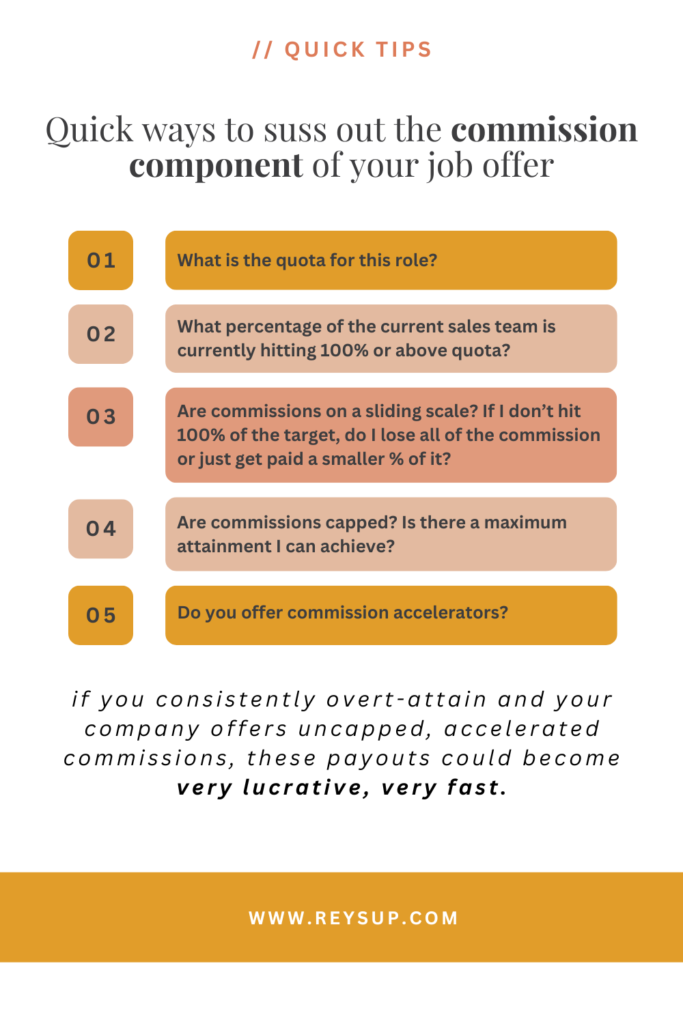This site contains affiliate links, view the disclosure for more information.
In this article we share how to negotiate a better job offer in tech with confidence. Learn how to evaluate, strategize, and secure the best compensation package to advance your career.
How to Negotiate a Better Job Offer in Tech: A Comprehensive Guide
A lot of people believe that the job search ends after you pass the interview round, but the reality is that there is still a lot of work to do post this step! Negotiating your job offer is a critical part of the process because it has the power to significantly impact your career and financial future. Lots of people dread this part – some feel uncomfortable asking for more, some are worried about how the employer will perceive them, and others are simply just exhausted from the process that got them to this point.

That said, if you don’t negotiate your offer, it could reflect poorly on you, signaling a lack of confidence in your abilities or lack of awareness of the value you bring to the table. For this reason, it’s essential that you negotiate a better job offer in tech with confidence, and fight for what you deserve.
In this article, we will share tips and tricks around how to best do this while. We will break down the common tech offer into components, give you strategies to ask for more, and share tips on how to remain unemotional and show gratitude for the opportunity. Let’s get into it!
Understanding the Components of a Tech Job Offer
Before we get into tactics to do the negotiation, we want to first spend some time breaking down the components of a typical tech job offer. Knowing what each component means and how it ladders into your overall compensation package will position you to negotiate more effectively.
Base Salary
The base salary is the fixed amount of money that you will earn on an annual basis. In standard tech offers, this is usually the largest component of your comp package and the most straightforward component.
By the way, if you want to validate if your base salary is in line with industry standards, you can research salary data and ranges for your role, industry, and location with sites like Glassdoor, Payscale, or even LinkedIn Salary Insights. You can take the salary you are being offered, and compare it to the standard salary ranges on these sites. While you are evaluating the ranges, make sure to consider other factors like your experience level, size of the company, and market. You can also network with others in your industry to get more authentic insights.
Commission
If you’re interviewing for a sales / account management position, your compensation package may include a commission. A commission is an additional component of salary that is awarded to you if you hit the goals outlined in your role. Commissions are complicated, so we will break this down with a few examples below.
- Let’s say your offer includes a base salary of $70K and a commission of $70K.
- Your base $70K is guaranteed whether or not you hit your goals (though you may be put on a performance plan if this persists over time).
- Your commission of an additional $70K is not guaranteed. This is only awarded to you if you hit your quota, and is usually paid out in chunks quarterly or semi-annually.
- When the recruiter gives you the offer, they could state it in either of the following ways:
- $70K base, $70K commission
- OTE of $140K with a 50/50 split. OTE stands for ‘On Target Earnings’ and represents the TOTAL amount you would make if you hit all of your goals. The 50/50 split means that 50% of the OTE is your base ($70K) and 50% of the OTE is your commission ($70K).
Additional components of commission
Commission can get pretty complicated, so it’s important to set up time with the hiring manager to get the fine details. Below are a few other things you need to be aware of:
- Some comp plans offer a sliding scale commission. A sliding scale commission is a type of commission structure where the commission rate varies based on the amount of quota achieved. Unlike a flat commission rate, where you earn the same percentage commission regardless of attainment %, a sliding scale commission increases or decreases the commission rate depending on your specific quota attainment. For example, your offer might include:
- Quota = $100,000
- 3% commission on the first $50,000 in sales.
- 5% on sales between $50,001 and $100,000.
- 7% on any sales above $100,000.
- Some comp plans offer commission accelerators. Accelerators are mechanisms that increase the commission rate that you get paid as you exceed your targets or quotas. As you can see in the above example, you earn a 5% commission on sales up to 100% of your quota. Once you exceed 100% quota ($100K), your commission rate ‘accelerates’ to 7% for any sales above that threshold.
It’s important to note that commission is usually the place where employees maximize their earnings. While on paper, 100% commission payout may equate to less than your total base, if you are someone who consistently overt-attains and your company offers uncapped, accelerated commission payouts, these payouts could become very lucrative, very fast.
Questions to ask your recruiter:
- What is the quota for this role? What percentage of the current sales team is currently hitting 100% or above quota?
- Are commissions on a sliding scale? If I don’t hit 100% of the target, do I lose all of the commission or just get paid a smaller % of it?
- Are commissions capped? Is there a maximum attainment I can achieve?
- Do you offer commission accelerators?

Equity
Some job offers in tech offer an equity component of the salary. This is the case for both public and startup (non public) companies, and especially common in more senior level roles. If you are applying for an entry level role, it may not be part of your package, but may be an opportunity as you move up through the ranks. Regardless, you should definitely ask your recruiter or hiring manager about it because it can lead to some pretty significant earnings.
Equity compensation usually comes in the form of incentive stock options (ISOs) or restricted stock units (RSUs).
- RSUs (Restricted Stock Units): These are shares of the company that are granted to you as part of your compensation. They usually vest over a period of time, meaning you gain full ownership after meeting certain criteria, typically related to the duration of your employment. If you are negotiating an offer from a non-public company, these RSUs will only hold value once the company goes public. To learn more, check out our other more comprehensive article on understanding RSUs here. Investopedia also does a great job of breaking down RSUs here.
- ISOs (Incentive Stock Options): These are options to buy company stock at a predetermined price. If the company’s stock price rises, you can purchase shares at the lower option price and sell them for a profit. However, ISOs come with specific tax implications and holding requirements. To learn more, check out our other more comprehensive article on understanding ISOs here. Investopedia also does a great job of breaking down ISOs here.
Sign On Bonus
Not all comp packages offer this, but this is a one-time payment offered when you join the company. This is usually offered to offset the cost of leaving your current job, or make the role more inticiting to you if you are juggling a few offers.
Relocation Bonus
If you are needing to move as a result of your new job, some companies will offer this bonus to cover (or offset) the expenses of moving. Most employers won’t offer this off the bat, so it’s a good extra incentive to ask for in the negotiation if you are in fact moving.
Benefits
Employers will always include ‘benefits’ as a part of the compensation conversation because after all, benefits do carry financial value. These are things like health insurance, retirement plans (like a 401k), paid time off, and sometimes perks like gym memberships or wellness stipends.
Understanding What You Can Negotiate
Now that we’ve walked you through the various components of the compensation offer, let’s get into how you can actually negotiate them.
Base Salary
This is where your negotiation should start. This salary sets the foundation for future raises and bonuses, so it’s really important to get this right. Employers are going to be the most resistant on this part, which is why it’s important to start your ask here.
Commission
If you’re in a sales role, you can (and should) always negotiate a higher commission rate or a lower sales quota to make your goals more achievable. Employers are usually more open to give on this component because it sets them up for only having to pay more when you contribute more. It’s more of a win-win.
Equity
You can either negotiate the amount of equity you receive or the vesting schedule. Most companies will offer a 1 year cliff, meaning you don’t get any shares until 1 year after you start. They also usually follow a 4-year vest period, meaning after the 1st year, they release to you in small chunks monthly for 4 years. These are all details that you can negotiate. The rule of thumb here is if you believe in the company’s long-term success, you should always push for more because it could pay off big time in the future.
Non-Salary Components
- Start Date: You might want to delay your start date to accommodate personal plans or to take a break between jobs.
- Location: If the company requires you to relocate, you can negotiate for remote work or a location closer to your preference.
- Work-from-Home Stipend: If you’ll be working remotely, you can ask for a stipend for home office equipment, internet costs, or phone bills.
- Sign-On Bonus / Relocation Bonus: As mentioned, these are negotiable and can help bridge any gaps in your financial needs when transitioning to the new role.
Understanding How To Ask for More Money
The frame of your negotiation is critical. Your tone, your words, and how you literally ask for what you want all play a factor in achieving your goals. We recommend avoiding using vague requests like “can you do better” and instead being specific about what you want and offer options.
- For example, you might say “I’d like to discuss either increasing my base salary by $10K or providing an additional $15K in equity”.
By providing options, you come across as more flexible and collaborative, rather than demanding or ungrateful. Also, it’s usually effective to ask for more in one key area (like base salary or equity) and pair it with a request in a secondary area (like a sign on bonus or benefits).
Prioritize YOUR financial needs:
- Prioritize Base Salary: If you need immediate financial stability, such as to cover living expenses or pay off debts, prioritize negotiating for a higher base salary.
- Prioritize Commission: If you’re confident in your ability to exceed sales targets, negotiating for a higher commission rate could lead to large earnings.
- Prioritize Equity: If you’re in it for the long run and believe in the company’s growth potential, negotiate for more equity because this is where you make the serious cash.
Understanding How Much to Ask For
As mentioned, it’s best to be as specific as possible when negotiating your offer. The general industry rule of thumb is to request anywhere between 5-25% more than the initial offer. Standard sales 101 training tells us to always aim high at first, but you also have to make sure you are asking for something that is insulting to the employer. It’s a balance.
Considerations to determine how much more to ask for:
- Market Rates: Research the market rate for your role in your location using tools like Glassdoor, Payscale, or LinkedIn Salary Insights.
- Company Size and Stage: Remember that larger, more established companies likely have less flexibility with offers, while startups might be more willing to negotiate equity over salary to bring in top talent.
- Your Experience: Make sure to play up your rare skills or extensive experience. You can leverage things like this to ask for a higher increase.
The method of communication matters
As a rule of thumb, you should always aim to put your negotiation requests in writing (email) to have a record of what was discussed and agreed to. Below is a template that you can use.
Subject: Request to Discuss Offer Details – [Your Name]
Dear [Recruiter’s Name],
Thank you again for the offer to join [Company Name] as [Job Title]. I’m very excited about the opportunity and am eager to contribute to the team. After reviewing the offer, I would like to discuss a few components of the package.
Specifically, I’m interested in exploring the possibility of increasing the base salary to [$X] or adjusting the equity grant to [Y number of RSUs]. Additionally, I’d like to discuss a sign-on bonus and relocation assistance.
Please let me know a convenient time to discuss these points further.
Thank you for your consideration, and I look forward to hearing from you.
Best regards,
[Your Name]
It’s always a good idea to follow the email with a call to the recruiter or hiring manager to walk through the requests out loud. A lot can get lost in translation (including tone) and this personal touch will help reinforce the fact that you are serious about the offer, but also grateful for it.
Additional tips for a successful negotiation
- Stay Positive: It’s important to remember to maintain a positive tone throughout the process. Always frame your asks as collaborative, and avoid coming off as adversarial.
- Be Appreciative: Remember to show gratitude for the offer and the opportunity to discuss it further. Don’t over do this as it can come off as ingenuine, but do it naturally so the party on the other end of the table understands your true intent.
- Don’t Apologize: Never say things like “I’m sorry to ask for more…” This completely undermines your position and makes you come off as junior or not confident. Negotiation is a very normal part of the hiring process and everyone does it.
- Don’t Disclose Your Current Salary: You shouldn’t be asked this but if you are, you can politely decline or deflect by focusing on the value that you bring rather than your past compensation. Sharing this salary may pigeon hole you and work against you.
What happens when the company can’t meet your requests?
Keep in mind that most companies will be willing to meet some of your requests, but likely not all of them. That said, if the company comes back and says no to everything, it’s time to evaluate your priorities. If the offer doesn’t meet your needs, and there’s no room for further negotiation, it’s okay to walk away. Just keep in mind – if you’ve already countered more than twice without success, it’s generally best to make your final decision. Continuing to push after this can come off as unprofessional.
In Summary
Negotiations can be stressful and challenging, but if you go into the room with knowledge of what makes up a comp package, where your priorities lie, and a rehearsed delivery, you are sure to get some (if not all) of what you want. Just remember, negotiations are a normal part of the process no matter how uncomfortable they may feel, and it’s important that you fight for what you deserve. Good luck!




